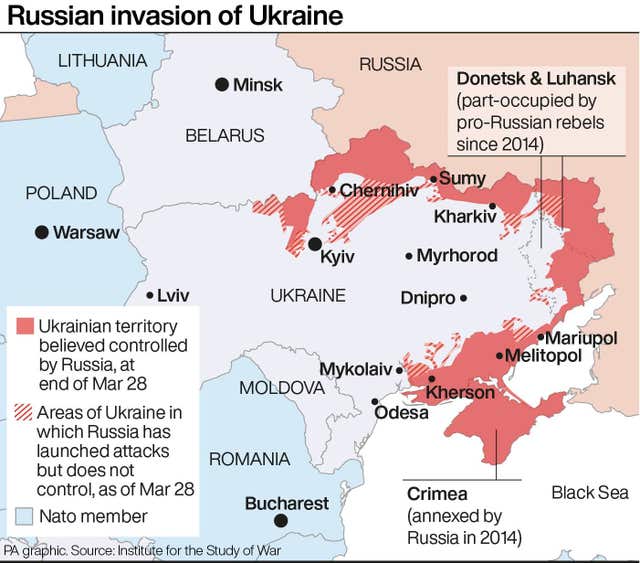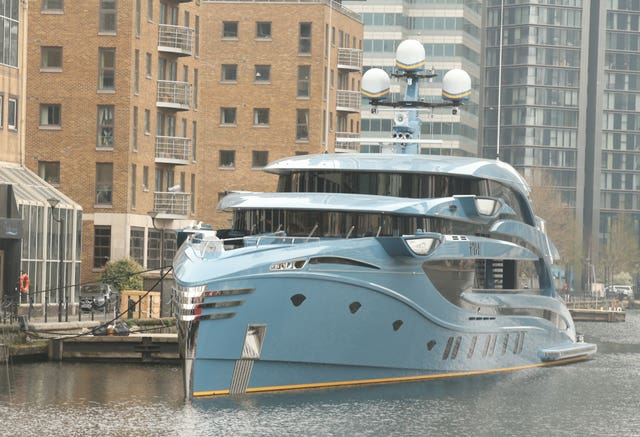Johnson warns Putin could ‘twist the knife’ as Russian forces falter
Britain is to step up military support to Ukraine amid fears the Russian president will try to inflict more damage on the country.

Britain is to step up military aid to Ukraine as Boris Johnson warned Vladimir Putin could still seek to “twist the knife” despite Russia’s faltering campaign.
The Chief of the Defence Staff, Admiral Sir Tony Radakin, told the Cabinet that Britain’s support was moving to a “new phase” as the Ukrainians sought to retake territory captured by the Russians.
The Prime Minister’s spokesman said they were looking at “all possible options” to ensure the Ukrainians had the equipment they needed while avoiding any “escalatory effects”.

Mr Johnson told the weekly meeting of senior ministers in No 10 that, while the Russian campaign continued to fail, Mr Putin could inflict further damage in an attempt to “twist the knife”.
He said it was important to maintain both military and economic pressure on the Russian regime and that a ceasefire alone would not be enough for the UK to lift its sanctions.
His warning came as Transport Secretary Grant Shapps announced that a £38 million super yacht belonging to an unnamed Russian businessman had been detained in London.
UK officials boarded the 58.5 metre-long Phi as it was moored in Canary Wharf in London’s docklands on Tuesday.

Mr Shapps told the PA news agency: “It’s just another indication that we will not stand by whilst Putin’s cronies are allowed to sail around the world in these kinds of yachts and people in Ukraine are suffering.”
In call on Tuesday, the Prime Minister and other leaders of the “Quint” – the US, France, Germany and Italy – reaffirmed their commitment to supporting the government in Kyiv while reducing their dependence on Russian oil and gas.
Earlier ministers were briefed by the chairman of the Joint Intelligence Committee, Sir Simon Gass, who said the Russian campaign continued to be beset by poor morale as members of the regime sought to apportion blame for its failures.
Overnight, British military intelligence said Russia was expected to deploy 1,000 mercenaries from the notorious Wagner Group to join combat operations in eastern Ukraine where they continued to suffer heavy casualties.
The private military company – which is already the subject of UK sanctions – had already reportedly been tasked, so far unsuccessfully, with tracking down and assassinating President Volodymyr Zelensky.
Western officials said there appeared to be an “element of desperation” about the move.
“They have a fearsome reputation but that is often for not adhering to the rule law and the law of armed conflict,” one official said.
“If you are reaching for a thousand Wagner troops thinking that is going to be crucial to succeeding in operations in the Donbas, it should give pause for thought as to how capable your broader force is.”
Meanwhile, Russian and Ukrainian negotiators met in Istanbul for their first face-to-face talks in two weeks, in a further attempt to see if they can find sufficient common ground to end the fighting.
Western officials reacted with scepticism to Russia’s announcement that it was “fundamentally” scaling back operations around Kyiv to “increase mutual trust” in the talks process.

“Nothing that we have seen so far has demonstrated to us that President Putin and his colleagues are particularly serious about that. It is more of a tactical exercise playing for time,” one official said.
It follows an announcement last week by Moscow that it was focusing its efforts on “liberating” the Donbas region of eastern Ukraine, currently part-held by pro-Russian separatists.
“Even if they do do what they say they are going to do that is not in any shape or form a cessation of hostilities,” the official said.
“I think we can continue to see as they refocus efforts on the Donbas, if that’s what they do, continued death and destruction there.”
Among those present at the talks in Istanbul in an apparently unspecified role was Chelsea FC owner Roman Abramovich, a long-standing associate of Mr Putin.
His appearance followed reports overnight that he and two Ukrainian negotiators may have been poisoned during an earlier round of talks.

The Bellingcat investigative website said the three suffered eye pain and skin irritation consistent with chemical weapons poisoning after attending peace talks on March 3.
There was speculation that he may have been targeted by hardliners in Moscow after attempting to negotiate humanitarian corridors.
Kremlin spokesman Dmitry Peskov dismissed the claims, saying they “do not correspond to reality,” but Downing Street described the allegations as “very concerning”.
“We’re working with international partners to establish more information,” the Prime Minister’s official spokesman said.
The spokesman did not rule out reports that the UK along with the US and Turkey could act as guarantors of Ukrainian security if it agreed to neutrality as part of any peace settlement.
“As far as I am aware there has been no formal request for that,” the spokesman said.
“We would listen very carefully for any request of UK involvement in a long-term peaceful solution but there has been nothing formal on that front.”





